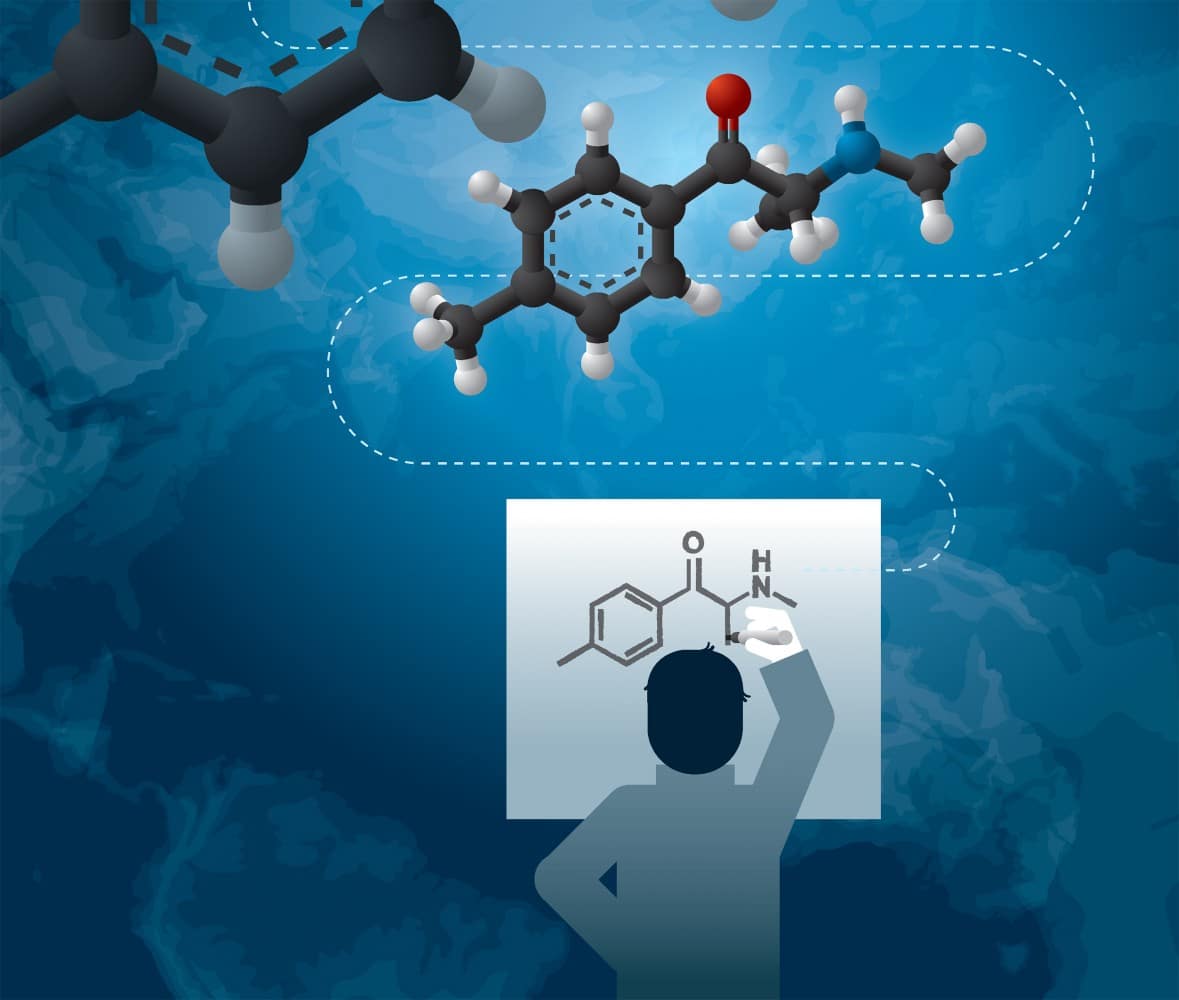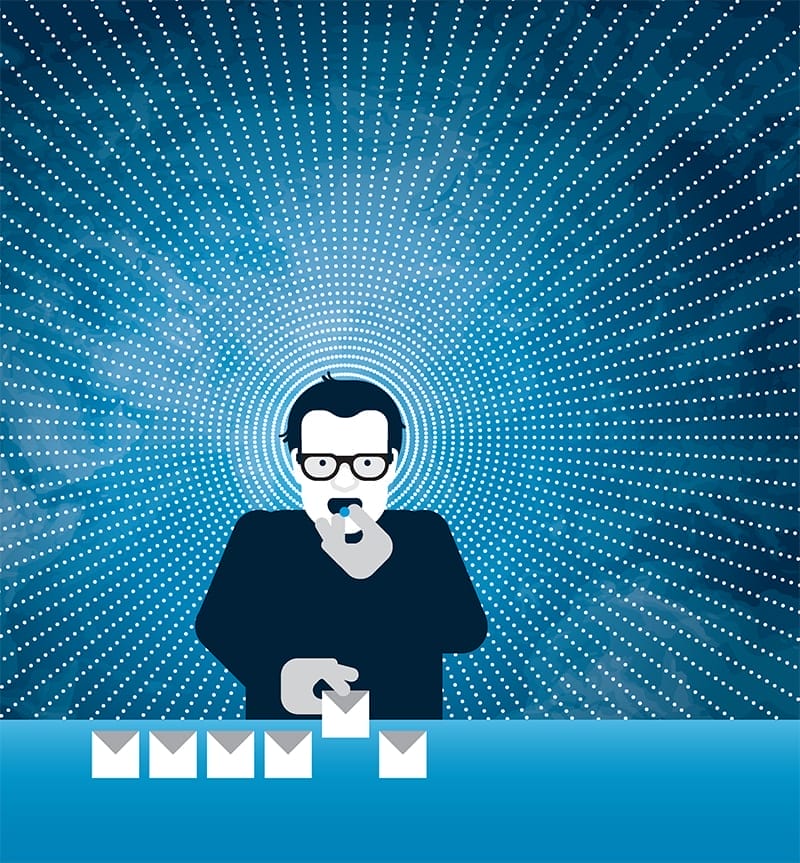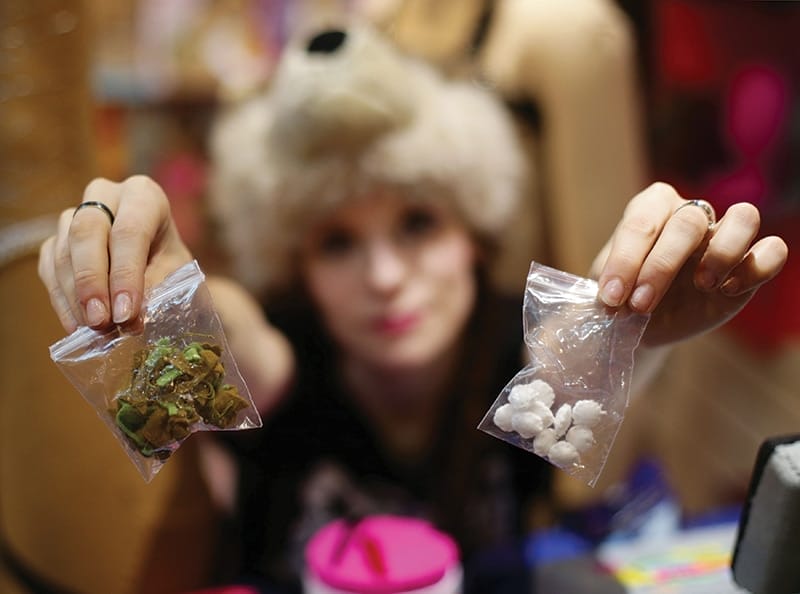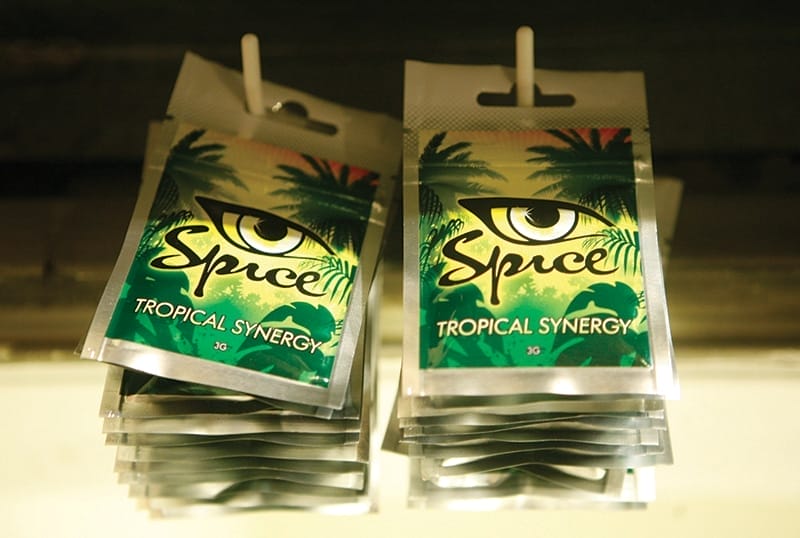The rise and fall of legal highs
On 26th May 2016, the UK government enacted a ban on so-called “legal highs”. Loes Witschge investigated how synthetic cocaine and marijuana made it to the high street – and why they had to go

Illustrations: Christian Tate
26th May 2016 (Taken from: #23)
The first step of developing a new psychoactive drug is surprisingly boring. It doesn’t involve Bolivian backwoods teeming with armed guerillas or the shaman-led sourcing of rare plants on high mountains. All it really requires, according to Dr Zee, is a decent grasp of chemistry and a whiteboard.
And he should know. Dr Zee is the most prolific inventor of what are known as Novel Psychoactive Substances (NPS), chemical compounds designed to mimic the effects of more traditional drugs such as cocaine and MDMA. Until recently, many of these substances were legal in the UK: Dr Zee first took the UK market by storm when he rediscovered Mephedrone – a compound first synthesised in 1929 – in 2003. Also known as Meow Meow and M-cat, the stimulant produces a similar effect to ecstasy. In its heyday, before it was listed as a Class B drug and banned in 2010, Dr Zee estimates that about a tonne of the stuff was sold every week in the UK alone.
Dr Zee follows a rigorous protocol when it comes to drug invention. He starts by drawing out the molecules of known drug compounds on a whiteboard and making small tweaks to their structure. Using chemical databases, he then screens his drawings for patent violation, bans already imposed on certain compounds or hints of danger – all disqualifying factors. A shortlist of potential molecules is sent to a chemist who sends back a stream of envelopes, each containing five grammes of the new substance.
The only way to find out what a new substance does to the brain is by testing it – and the only lab Dr Zee is willing to use is his own brain”
This is where Dr Zee’s job moves from the scientific to the psychedelic. The only way to find out what a new substance does to the brain is by testing it – and the only lab Dr Zee is willing to use, at least initially, is his own brain. “The testing process is extremely time-consuming,” Dr Zee tells me. “Each compound is tested at different dosages and via different methods of administration. I start by ingesting a tiny dose and then doses grow in size logarithmically in between trials.” He usually leaves two days between sampling, to allow for a delayed effect to occur and to make sure the previous trial substance has left his system.
There is, of course, a fair degree of danger in ingesting untested chemical compounds, but Dr Zee claims he’s got things under control: he has read plenty of case studies to know which things to avoid. “I have never experimented myself into a life-threatening situation,” he says. “But I don’t want anyone to get the wrong impression that what I do isn’t risky – you really have to know what you’re doing in order to keep out of harm’s way.” If the high is good, Dr Zee will send his compound to an animal testing laboratory and then – if given the all clear – to “psychonauts”, people who have made a hobby out of exploring altered states of consciousness. Then it’s time for production, usually in bulk and usually in Asia, before the new drug is shipped across the world.
Drugs like the ones made by Dr Zee were until recently sold as “legal highs” in online stores and at high street “headshops” across the UK. A Home Office report estimated that last year 244,000 people aged 16 to 59 had used NPS in England and Wales. In 2014 alone, 452 different kinds of NPS were reported to the UN drug agency. It has been a large and swiftly-growing market.

Christian Tate
Packaged in colourful bags emblazoned with names like Gogaine, Pink Panther and China White, legal highs encompass the whole gamut of drug experiences, from the smokeable to the snortable and even the injectable. In the UK, the bags have always been stamped with the words “Not for human consumption”, even if that advice has been routinely ignored. To stay on the right side of the law, sellers would advertise their produce as bath salts, herbal incense or, ominously, “research chemicals”.
In the simplest terms, legal highs were legal because they had not yet been banned. Under the Misuse of Drugs Act, which has governed the UK’s drugs policy since 1971, drugs were blacklisted one by one according to their chemical make-up. In the case of NPS, inventors like Dr Zee could circumvent these bans by slightly tweaking the formula to create a new, legal product and let business continue as normal. For the British government, identifying and banning these substances became a task of Sisyphean proportions.
All that changed, at least in the UK, on 26th May, when the Psychoactive Substances Act (PSA) came into force. Instead of outlawing drugs one at a time, this new bill introduced a blanket ban on all psychoactive substances. In order not to completely rupture the social fabric that holds the country together, it made exceptions for alcohol, caffeine, tobacco and amyl nitrate, aka poppers.
For Dr Zee, the ban sits uneasily with his belief in “cognitive liberty”. “It’s people’s right to change their state of consciousness,” he says. “I strive to make new options available to them if they are safe and legal.” Zee’s creations are still available in any European country where they are legal, but he admits that the closure of the UK market has dented his revenues. Fortunately for him, he’s not in it for the money: he claims he has never made a profit from his work. Dr Zee believes he is trying to help people to cope with their primitive brains in a developed society. “These days we have stress and competition and technology – all unnatural problems,” he explains. “I think drugs can help correct our mindset to function in a way that’s more in sync with today’s reality.”
The comedown
Jim Butcher is decidedly less philosophical about the ban. “It’s hit my pocket big time,” he says sadly. Butcher is the owner of Vape on the Lane, a south London shop which was until recently known as the HSL Headshop. Today, the space seems to serve two distinct types of clientele. One table showcases a dazzling array of vaping accessories and a wall display is lined with e-liquids with names such as Captain Custard and Starboard. But another wall is hung with a range of bongs in various sizes while a small rack boasts the latest issues of Weed World and a dishevelled-looking copy of Cooking with Ganja.
Headshops like Butcher’s used to sell NPS over the counter. It was good business and made up more than 90 percent of Butcher’s revenues, with up to 100 packets of drugs priced between £10 and £25 sold daily. Butcher also ran party-night deliveries, bringing legal highs direct to people’s doors.
According to official numbers, the drugs were not risk free. Between 2004 and 2013, the Office of National Statistics registered 76 deaths involving legal highs, 23 of which occurred in 2013 – the last year for which its data is currently available. While these numbers pale in comparison to deaths involving other substances – there were 765 deaths involving heroin or morphine in 2013 – the easy availability on the high street was a major problem according to Jeremy Sare.
People thought that something you bought on the high street wouldn’t harm you, that legal highs had been through a safety assessment”
Sare works for the Angelus Foundation, the UK’s only charity aimed at raising awareness about NPS. It was founded by Maryon Stewart after her 21-year-old daughter died after taking the then-legal party drug GBL. The charity was a key driving force behind the campaign to get legal highs banned. “People thought that something you bought on the high street wouldn’t harm you – there’s an assumption that these legal highs had been through a safety assessment process,” says Sare.
The issue was further compounded by the fact that, with no regulation in place whatsoever, very little was known about the contents of each bag. “You really could buy five packets of the same product name and you’d find different mixes of chemicals in different strengths,” says Sare. “Ultimately, safety comes down to measuring a dose. If you can do that, then you can manage the harms of a particular substance. If that is unknown, then these drugs are high risk.”

Photo: Yui Mok/PA Archive/Press Association Image
To Butcher’s mind, meanwhile, many of the legal highs he sold were safer than street drugs because each packet said exactly what its contents were. He believes that the ban will just lead to a more dangerous situation. “I’ve heard that the coke dealers are well happy,” he says with a touch of bitterness. “They’re selling more again and they’re still cutting it with whatever they feel like. People now don’t know what they’re buying – it’s pot luck.”
After the ban came into effect, Butcher closed down his shop for nearly a month. He claims he’d been targeted by undercover police, checking he was abiding by the law. “I had a lot of police activity around the shop,” he explains. “They’d come in, asking if I sell stuff and wearing builders’ outfits which were so clean, so pressed out of the packet it was unreal. Their haircuts, the clean fingernails. I thought, there’s no way on God’s earth that you’re a builder.”
By temporarily closing his shop, Butcher also wanted to send a clear signal to the regular customers who kept returning, asking for legal highs. While he maintains that the powders and pills should have been regulated rather than banned, the state of some of these customers in their post-ban withdrawal has made him feel differently about his former top-selling drug, synthetic cannabis, aka Spice. “I now know how bad some of this stuff has been. It’s had an effect on an awful lot of people. How my customers felt afterwards and what has happened to them…” Butcher’s voice trails off. “Unscrupulous suppliers were putting stuff into the smoking mix that gave them a slight high, but it also made them want to have more and it messed with their brains. It’s a pity it took so long for me to find out.”
Originally a brand but now often used as a catch-all name, Spice refers to a mix of herbs or tea leaves sprayed with chemicals designed to mimic the effect of weed. Hundreds of varieties of Spice were available in the UK until recently, some containing compounds used in fertilisers, cancer treatments and painkillers which were a hundred times as powerful as THC, the active ingredient in regular cannabis. The drug has been linked to medical conditions including psychosis, stroke, kidney damage and respiratory failure. In the US, 8,000 cases of poisoning by synthetic cannabis were logged in 2015; in Russia, 700 hospitalisations and 25 deaths were reported after the introduction of a new strain of Spice in 2014. The drug has been rife in British prisons: in May of this year, the chief inspector of prisons said synthetic cannabis was having a “devastating impact”, with 19 deaths linked to the drug between 2012 and 2014.
Up in smoke
“The Psychoactive Substances Act is ill-conceived and certainly badly constructed but it does take a lot of crap off the market,” Mark Watleigh tells me. “Spice was being sold with some seriously dodgy chemicals in there.” It’s quite the statement from the man who brought Spice to the global market.
Watleigh has a long history in the legal drugs industry. A long-term “stoner” and “psychonaut”, he turned his hobby into a profession in the early 2000s, when he sold psychedelic mushrooms at London’s Camden Market. He ceased trading in July 2005 after a government ban was imposed. By then, however, he was already developing the world’s first ever synthetic cannabinoid.
You’d be hard-pressed to find anybody who thinks the war on drugs has worked. If people really want to take drugs, they will keep doing it”
It took a while for Watleigh’s Spice to take off, in part because, at about £25 per 3.5-gramme bag, it was expensive. Early on, Watleigh found a grateful market in the Channel Islands, where Customs were highly effective at restricting importation of cannabis. Prisons, too, gave Watleigh a lot of business, simply because inmates could have it brought in by visitors as it wasn’t a controlled substance. Over time, this early – and at the time only – version of Spice grew in popularity among a broader audience and Watleigh and his co-developers started raking in good money. When asked for a figure, Watleigh is circumspect. “I can say it was fairly sizeable,” he finally concedes. “We probably approached a full shipping container. That’s quite a lot.”

Markus Schreiber/AP/PA Photos
The government eventually caught up and a ban was announced in 2009. Watleigh and his companions folded the venture and never sold a legal high again (these days, he runs a catering company). But for Watleigh this is where the Spice story turns sour. Other producers took the brand name and packaging and started using them to sell synthetic cannabinoids and other stimulants with new and ever-changing chemical compounds, many of them harmful. “Having had our brand hijacked and all sorts of nonsense put in there, it breaks my heart,” says Watleigh. He thinks that the real blame, however, lies with the government. “When you take a legal product off the market for which there is no evidence of medical harm, that demand is going to be filled elsewhere,” he says. While he is at least happy that the Psychoactive Substances Act has taken the more harmful iterations of synthetic marijuana off the market, he doesn’t see banning drugs as a long-term solution. “You’d be hard-pressed to find anybody who thinks the war on drugs has worked,” he says. “If people really want to take drugs, they will keep doing it. What other option do people have now than to put money in criminals’ pockets?”
High standards
Home office minister Sarah Newton’s remit covers the government response to a long and disparate list of topics including hate crime, wildlife crime, lap dancing and gangs. With her drugs hat on, she’s pleased with the initial results of the ban on NPS. “The new powers are already having an impact on the trade of these drugs,” she says. “Police have made arrests across the country of those involved in the supply, a number of headshops have ceased trading, and action by the National Crime Agency has resulted in the removal of psychoactive substances being sold by UK-based websites.”
The bill’s enactment was far from smooth, and was delayed by more than a month after police and the Advisory Council on the Misuse of Drugs pointed out that its vague definition of psychoactivity might make it impossible to enforce. Experts including Professor David Nutt, the former chief drugs advisor in the UK, cricitised the legislation, calling the bill “draconian” and saying it would result in more deaths by driving people back to alcohol and more traditional illegal drugs. Sare says that there is evidence of under-the-counter NPS sales at some newsagents and souvenir shops.
It’s too soon to tell whether the Psychoactive Substances Act will lead to an absolute decline in drug use, a proliferation of NPS on the black market or a shift back from NPS to booze and weed. What the law has done is to simply erase the “legal” denomination and bring these drugs into the domain of a more general discussion on whether banning drugs is an effective way to reduce harm.
We can’t keep drugs out of prisons and we pay someone to walk around the walled perimeter. Good luck keeping them out of the country”
“Legal highs is essentially a bogus category. Every drug was like this once,” says Johann Hari. “The story of what happened with heroin and cocaine in the early 20th century is a story about legal highs.” Hari is the author of Chasing the Scream, a book in which he examines the 100-year-old war on drugs. His conclusion is damning, and Hari thinks that – as with other drugs – placing the ‘illegal’ label on NPS will not have the desired effect. Enforcing any drug ban is no more than a “grotesque waste of money”, thinks Hari. “Every police officer I’ve ever asked ‘Do you think there were any fewer drugs after all this effort?’ – not one of them has said yes. We can’t keep drugs out of prisons and we pay someone to walk around the walled perimeter. Good luck keeping them out of the country.”
Hari concedes that the situation prior to the ban was far from desirable. “If you have new substances being invented and you have no regulatory structure to assess their safety you’re in a real bind. They’ll keep being invented and some will be terribly dangerous. We do not want a country where people are taking untested drugs brazenly,” he says. But in his view, prohibition is the worst possible way of reducing harm: “It’s the one that empowers all the criminal gangs and the one that guarantees the worst quality products.”
The middle way could be to set up a regulatory framework in which new drugs can be invented, go through stringent safety tests and gain a license for legal sale. New Zealand passed a bill in 2013 which paved the way for such regulation of NPS. It initially granted interim licences to about 40 new drugs, but these were revoked months later when political will for the programme dissipated. Then the licensing process became much more difficult when animal testing was forbidden as a means of determining the health risks of a substance. Today, no drugs have been licensed under the law, and no new applications have been submitted.
Hari’s expectations of a regulatory framework being put in place in the UK are limited. “Politically, we’re not going to get that until we have a movement demanding it,” he says. “No politician is going to be brave enough to just introduce it. It’s going to take time and the longer we wait, the more people will die, the more people will be injured, and the more dangerous the whole thing is.”
Compound interest
Three months after the enactment of the PSA, Dr Zee doesn’t think the ban should signify the end of Britons’ cognitive liberty. He is working on ways to let people explore their consciousness without breaking any laws. Taking advantage of the fact that possession – as opposed to selling – of NPS is still legal, Zee has invented a device that is modelled on a coffee maker. The machine takes a legal substance and – after a few hours of heating it in hydrochloric acid – dispenses white powder which will get you high. Ever the idealist, Dr Zee hopes the machine will trigger a “paradigm shift” in how drugs are consumed: from an often spontaneous act which involves criminal sellers to something that is planned in advance – and legal. “It’s part of a ‘recreceutical corporation’ concept which creates products for on-demand mood control for the modern age,” he explains.
Dr Zee has finished prototypes of the machine and is nearly ready to take them to a manufacturer, but he still needs to work out how many grammes of drugs the €3,000 gizmos will dispense per brew. The problem he sees is that while two grammes might not justify the price tag, a bigger dose might turn each brewer into a seller – and therefore a criminal. It’s a dilemma he’s not quite sure how to tackle.
At least the name of the device has been decided on, and it’s pretty catchy. Psychonauts can keep their eyes peeled for the Methspresso Machine, coming to stores soon.
Slow Journalism in your inbox, plus infographics, offers and more: sign up for the free DG newsletter. Sign me up
Thanks for signing up.








